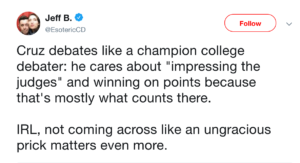As regular readers will know, I’ve spent a generation or more [1] deriding what I call the generation game – the idea of dividing the population up into birth cohorts (categories based on year of birth) such as Boomers, X-ers and so on (Millennials weren’t invented when I started) and assigning them various supposed characteristics. Most of the time, this exercise is little better than astrology. To the extent that there is any semblance to reality it simply reflects the fact that young people are, and always have been, different from old people.
But just as I have managed to get some traction with this idea, genuine cohort effects have emerged in politics in many countries. The sharpest case is Britain, where people over 65 voted massively for Brexit in the referendum and the Conservatives in the recent election, while those aged 18-24 went even more sharply the other way. As the map linked here shows, if only 18-24 year olds were voting, based on current polling data, the Conservatives would not have won a single seat[2]. If only those over 65 voted, the Conservatives would win 575 and the combined opposition 54.
This is a massive difference and can’t AFAICT be fully explained by differences in education, ethnic composition and so forth. It also represents a huge shift on the part of older cohorts, who were part of the electorate that gave Labour three terms not long ago. While there is some tendency for people to become more conservative as they age, it’s normally much more limited than this.
The explanation in simple terms, is Brexit. Most of the time, elections involving competing visions of the future. In the UK case, from the 1990s until Brexit, the contest was between hard-line Thatcher-style neoliberalism and Third Way Blairite soft neoliberalism. In the course of such debates, both sides routinely claim to be on the right side of history, to own the future and so on.
By contrast, Brexit represented an appeal to a (partly imaginary) past, against the present and the future. With the exception of a handful of neoliberal ideologues, who saw Brexit as a path to a free-market future, most Leavers were motivated by nostalgia for the glories of the past, and were willing to sacrifice the interests of the young to make a gesture in that direction.
What’s true of Brexit is true, though not to quite the same extent, of the culture war politics that have now become dominant on the political right in much of the English-speaking world. It’s driven in large measure by old men who lost the cultural battles of the 1960s and 1970s, and have never got over the fact.
The result is a situation where the right is appealing directly to members of older age cohorts with the result that younger cohorts are moving left. The most immediate effect has been to wipe out the support base of centrists of the Blair-Clinton-Keating type, who fail to appeal to either group.’m
[click to continue…]

 For any public art lover or sculpture lover, the
For any public art lover or sculpture lover, the 
